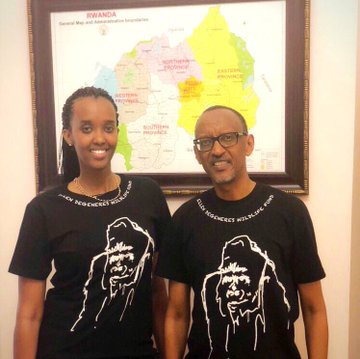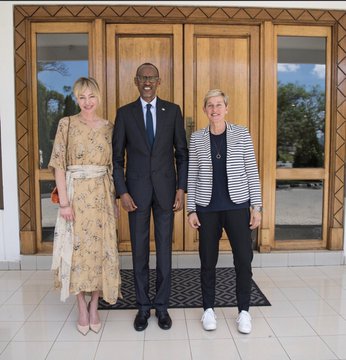Rwandan President Meets With Ellen DeGeneres and Her Wife, A Move That Will Change Many LGBT Lives in This Country
It was a brief meeting. So unofficial that the international press barely covered it, yet this handshake has the potential to make thousands of lives better.
At the end of May, America’s favorite television host Ellen DeGeneres and her wife Portia de Rossi met Rwandan president Paul Kagame in the capital Kigali. The trip was part of DeGeneres’ work with the Ellen DeGeneres Wildlife Fund. The fund supports Rwanda’s mountain gorillas through the Dian Fossey Gorilla Fund.
Encouraging to see the mountain gorilla population in the Virungas has grown 25% in the last eight years. Conservation efforts must continue. Thank you @TheEllenShow & Portia for coming to Rwanda & getting involved. #VisitRwanda
During the courtesy call, DeGeneres gave Kagame a T-shirt and the three posed for photos together. Ever-media savvy, Kagame’s people tweeted the meeting and posted the video on his YouTube channel, with no further detail from either. Yet, the short meet-and-greet between a lesbian celebrity couple and the world’s favorite African strongman has the potential to signify much more for gay rights in East Africa.
Last year, when a gay Rwandan TV journalist publicly proposed to her partner, their planned nuptials caused an uncomfortable debate and anger in a conservative society. Rwanda’s LGBTQI community has not faced the kind of persecution seen elsewhere in the region, but they became the target of backlash when the proposal challenged traditional notions of marriage.
“They wondered, ‘Who are they? Who is who in the relationship?’ We started to get harassed again, so we stopped going out in the street of Kigali, we were scared,” said Carter, a transgender man and rights activist, talking to Voice of America after the incident. Still, the public proposal empowered a community that has lived in the shadows.
In 2008, for example, a Rwandan lesbian couple was reportedly prevented from attending a conference on lesbian feminist thinkers in the Mozambican capital Maputo. Today, while gay marriage isn’t legal in Rwanda, the government does recognize the LGBTQI community’s right to live openly.
Rwanda has done away with colonial-era anti-gay laws and Kagame said at a meeting in San Francisco in 2016 that being openly gay in Rwanda “hasn’t been our problem. And we don’t intend to make it our problem.” Rwanda is more progressive than its neighbors, but has yet to use its influence for the better in the region.
In 2017, Rwandan police arrested Ugandan LGBTQI activist Kasha Jacqueline Nabagesera, as she arrived in Kigali. They deported her back to Uganda, where homosexuality is illegal and violently repressed. In Uganda, police go as far as raiding gay pride events and gay film festivals.
Rwanda’s other neighbor, Burundi, has moved to strengthen its anti-gay legislation. In Kenya, homosexuality may not be persecuted, but it is openly frowned upon, most recently through the banning of the filmRafiki, a coming-of-age lesbian love story.
Kagame’s legacy is divisive. His clean capital and well-run run country belie a regime accused of being repressive. The economy’s steady growth is used to justify extending Kagame’s term and the gender parity in his cabinet distracts from his silenced opposition.
In spite of all of this, Kagame holds much influence as a leader in his region, especially on gender rights. It’s why women frustrated by discrimination in the African Union turned to him specifically. And it’s why posing with DeGeneres, whose own coming out more than two decades ago changed American attitudes, could be more than a photo-op—it could be a regional turning point.


Comments